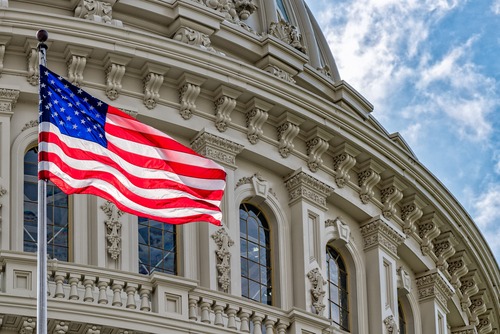
The FY25 National Defense Authorization Act (NDAA) narrowly advanced out of the House last week in a 217-199 vote, largely split down party lines.
With three Republicans opposing and six Democrats supporting, the legislation (H.R. 8070) has been a point of contention between the political parties as several legislators criticized the GOP inclusion of amendments related to prohibitions on abortion rights for servicemembers, climate change efforts, and DEI funding.
While the NDAA is traditionally an area of some bipartisanship, this was the second year in a row House Republicans pushed for divisive priorities, which will likely create hold-ups and an ultimate stalemate in the Senate.
Among its military defense sections, the bill authorizes the modernization of a strategic nuclear deterrent, mandates merit-based personnel management policies across the Department of Defense, and proposes military quality-of-life reforms.
“We cannot kick the can down the road when it comes to providing for our servicemembers,” U.S. Rep. Mike Rogers (R-AL), chair of the House Armed Services Committee, said. “Today, the House voted to increase pay for junior enlisted servicemembers by 19.5%, improve unaccompanied housing, expand servicemember access to childcare and healthcare, and support military spouses. Our servicemembers are the bedrock of our national security, strengthening our military starts by ensuring our servicemembers are taken care of.”
Rogers also pointed to investments in undersea capabilities, boosts to innovation, and support for soldiers in the bill.
However, after House Speaker Mike Johnson agreed to allow various socially conservative amendments to the defense-focused bill, it adopted measures to limit critical race theory, prohibit the display of unauthorized flags at military installations, prohibit reimbursement for female troops in need of abortions or reproductive health care, and limit funding for diversity, equity and inclusion programs, among others.
“For more than 60 years, Democrats and Republicans have worked in good faith to pass the NDAA,” Senate Majority Leader Chuck Schumer (D-NY) said after the House’s vote. “The Senate’s defense authorization process has always been a model of how both sides can work constructively to provide for our nation’s defense, take care of our service members and DOD civilians, and make the investments necessary to innovate for the future. Unsurprisingly, the legislation coming out of the House today is loaded with anti-LGBTQ, anti-choice, anti-environment, and other divisive amendments guaranteed not to pass the Senate.”
The White House released a statement ahead of the House passage of the bill that applauded the efforts to create the most recent NDAA but took issue with several provisions within. The statement provided a full outline of the administration’s opposition to amendments, including but not limited to prohibitions on DEI programming, an increase of junior enlisted basic pay before completion of the Fourteenth Quadrennial Review of Military Compensation, prohibitions on minimizing climate change risks, and prohibitions on cannabis testing for enlistment or commission in certain Armed Forces.
“The Administration looks forward to continuing to work with Congress to set appropriate and responsible levels of defense and non-defense spending to support the security of the Nation,” the statement read. “Coupled with a strategically sound defense budget, a strong economy and investment in diplomacy, development, and economic statecraft are critical to ensuring that the Nation is positioned to respond to the myriad national security challenges we face today and will face in the future.”




